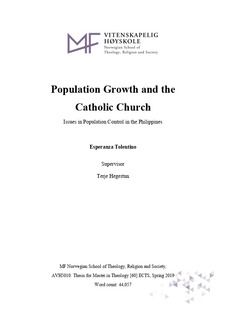Population growth and the Catholic Church : issues in population control in the Philippines
Master thesis
Permanent lenke
http://hdl.handle.net/11250/2610989Utgivelsesdato
2019Metadata
Vis full innførselSamlinger
Sammendrag
This research aims to investigate the role and contribution of the Catholic Church by reflecting on the place and function of religion in the public sphere concerning overpopulation in the Philippines while promoting Responsible Parenthood. This research would like to give a critical account of how the Catholic Church deals with Responsible Parenthood for the welfare of the Filipino people. Moreover, this study aims to promote the knowledge about Responsible Parenthood and deepen the understanding of the problems of population growth in the Philippines and how the Catholic Church intervenes in developing family planning methods.
First, this research also tries to clarify the various senses of the term children are “blessings from God” from Filipino perspective. Secondly, this paper explores the several problems of the population resulting from Filipinos “bahala na” attitude or leaving everything in God’s hand and the future. Thirdly, it also brings attention to Christian maturity that applies especially to Filipino males who primarily decide how many children they will have. And though religiosity and accepting one's fate is somehow a positive response in every bad situation. The author contends that it is best if Filipinos can avoid “bahala na” attitude and instead face the moral obligation to act responsible rather than having too many children they can provide.
Furthermore, it is better to view children as a parent’s responsibility and commitment towards raising them. Because the role of parents on their children's development process also depends on how many children they had. Thus, considering the regressiveness of the impact of additional children, there will be more repercussions from a more impoverished and enormous household. Additionally, this paper also suggests that the Catholic Church should promote smaller families and encourage parent’s who provide quality lives to their children rather than parents who abandoned their responsibility.
In this hermeneutical research, I collected data from the literature, journals, CBCP’s encyclical letter and the Vatican, government statistical records, blogs, websites of advocacy groups and newspaper clippings and video archive concerning teenage/unplanned pregnancy, family issues, responsible parenthood, and reproductive health debates. While understanding the present situations of the socio-economic contexts, traditions and life circumstances that lead Filipino families in overpopulation and poverty, thus, cultural and religiosity are embedded in responsible parenthood practices in the Philippines reflecting the strong influence of conservative religious belief.
